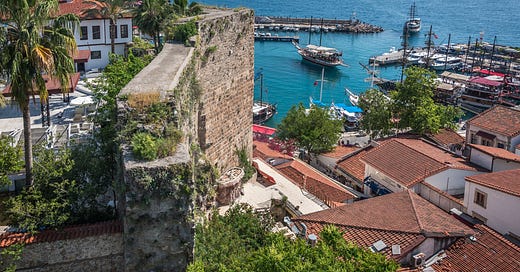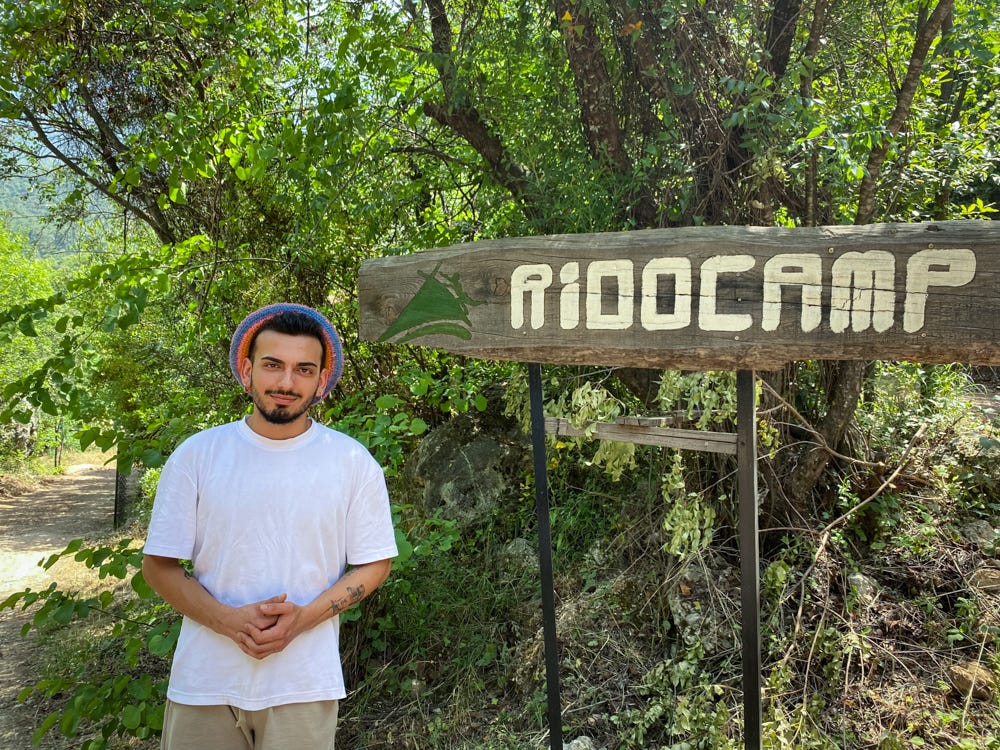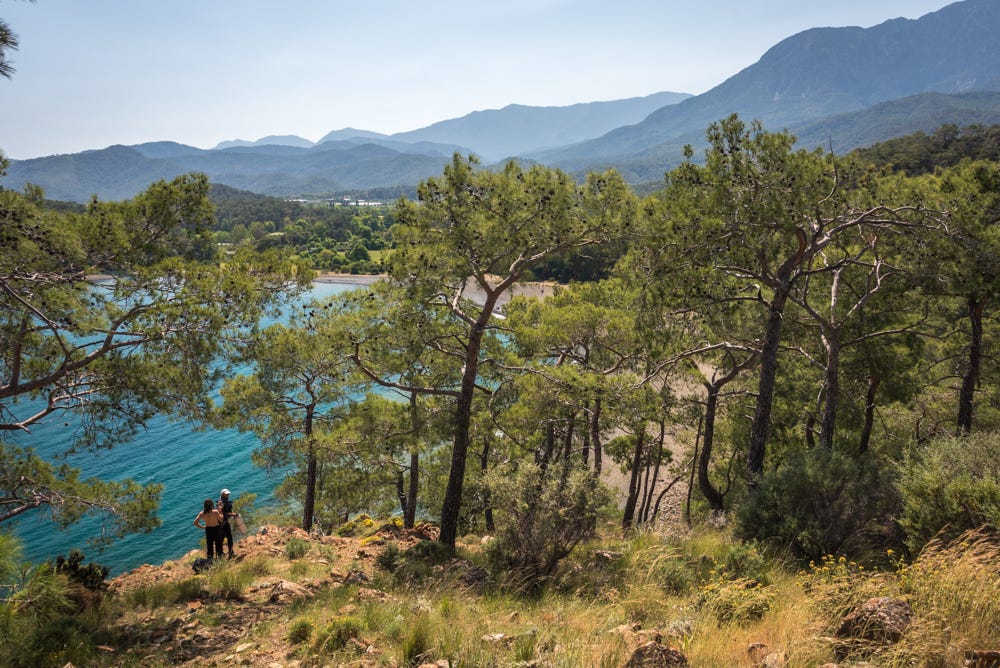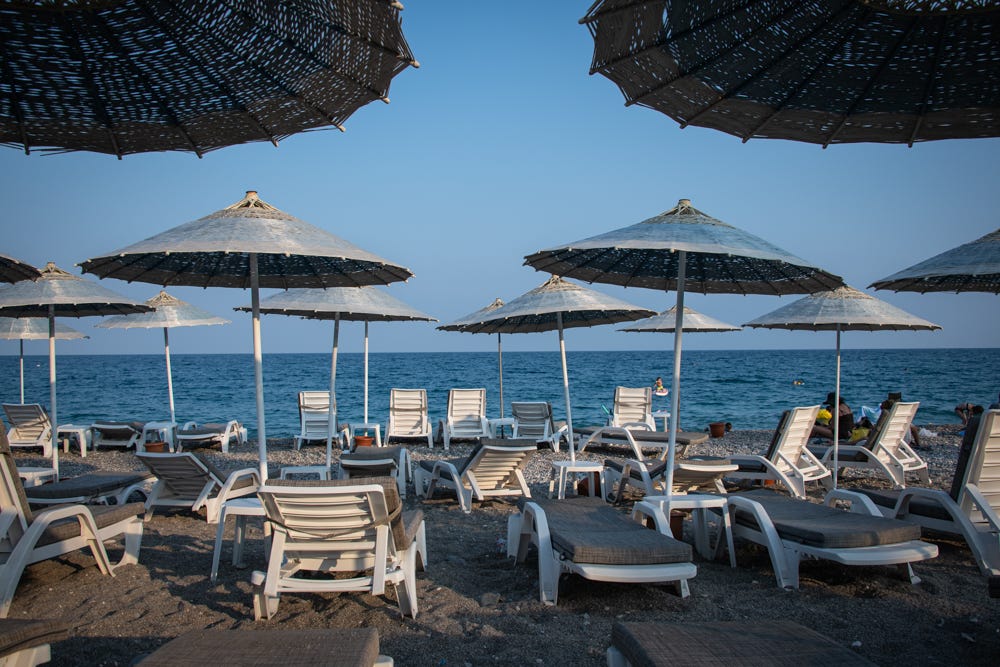ANTALYA – Considered the backbone of Turkey’s tourism industry, the southern Mediterranean city of Antalya has long attracted visitors from around the world. From beaches to luxurious golf clubs to hiking on the Lycian Way, the holiday destination offers something for everyone.
Of the more than 56 million tourists that visited Turkey last year, about 15 million visited Antalya, according to the province’s Directorate of Culture and Tourism.
This year, however, local business owners are grappling with the impacts of high inflation and rising prices, which many said are changing spending habits with ripple effects across the local economy.
Abdullah Kılıçalp, business manager at the Grand Erken boutique hotel and restaurant in the city’s historic center of Kaleiçi, said many Antalya residents depend on the thriving tourism sector for income.
"If tourism in Antalya collapsed, this would have a direct impact on every sector in the city,” Kılıçalp said. “The main source of money comes from tourism and spreads out to all other sectors."
Kılıçalp added this year’s high season kicked off slower than in past years. “Even though the season has started, Kaleiçi is empty,” he said in June.
According to the most recent official data from the Turkish Statistical Institute (TÜİK), Turkey’s hotel and restaurant industries experienced a 91 percent price increase compared to last summer.
In response, tourists and businesses in Antalya are adapting in a variety of ways. Rüzgar Özdemir, business manager of Antalya’s Rido Camping, said more visitors are opting to stay in tents for their holidays to cut down on accommodation costs.
"A significant change in customers' behavior was their transition from staying in more expensive bungalows to much cheaper tents this year," Özdemir told Turkey recap.
Coping with high inflation
The Rido campground, located in the popular climbing area of Geyikbayırı, sought to stabilize prices by pegging them to Euro values instead of Turkish liras. Many other campsites in the area have since done the same.
As a consequence, “We have fewer Turkish climbers coming to the camp this year," Özdemir said.
Hediye Çete, a board member at the Professional Hotel Managers Association’s (POYD), told Turkey recap that hotels also budget their income in Euros and their expenses in Turkish liras. She said it’s just one of many ways the hotel sector tries to cope with high inflation.
Still, the price changes don’t impact all tourists the same way. Earlier this summer, Swiss traveler Severin Spälti biked through the country and camped outdoors.
"I don’t think I am much affected by inflation. For me, prices are more or less the same," Spälti said, comparing prices between 2024 and his last visit in 2021.
However, Spälti seems to be an exception. In contrast, a British tourist who asked to remain anonymous noted a significant increase in prices of food and alcohol compared to his previous trips to Antalya.
He said he once saw Turkey as a cheap holiday destination, but no longer believes this to be true. During his last visit to Antalya this year, he was surprised by the pace of inflation, particularly at bars and restaurants.
“Quite an ordinary-looking seafood restaurant charged me 2,400 liras [about 70 Euros] for a meal for one,” the tourist told Turkey recap. “Inflation is harmful enough for tourism, but deliberately ripping tourists off in this environment is particularly horrific and results in many holiday-makers avoiding Turkey.”
The Antalya Directorate Provincial Directorate of Culture and Tourism did not respond to requests for comment for this report.
Impacts on the industry
High inflation has reached all areas of the tourism sector as even small construction projects take a toll on businesses.
"We are going to renovate the kitchen at the campsite. When we asked the price for the renewal in May, it was 100,000 lira, but now, as we start, the construction price has risen to 500,000 lira," Özdemir said.
Çete added increased labor costs after the 49 percent increase to Turkey’s minimum wage in December also pose a “debilitating problem” for business owners.
Gül Gümüş, a beach club owner at Konyaaltı Beach on the western side of Antalya, echoed the sentiment. She said she was concerned about increased labor costs, adding it was one the main expenses for the business.
“Around 30 people are working in rotating day and night shifts,” Gümüş told Turkey recap. “We pay between 40,000 to 50,000 Turkish lira for each employee, significantly higher than the minimum salary, while rent prices in the Konyaaltı area range from 30,000 to 35,000 lira per month.”
On top of wages, Gümüş said the club’s rent increased this year from 2 million to 4 million Turkish liras per month. As she spoke, she was surrounded by many empty seats on the property.
"For these beach clubs to cover their expenses, they need to sell products at a significant markup,” Gümüş said. “For example, a product we purchase for 20 liras must be sold for 200 liras.”
Priced out
Aleyna Öznülüer, a 26-year-old tourist from the eastern province of Erzurum, visited Antalya for a holiday this summer. She had previously vacationed in the city, but this time Öznülüer recounted the stark differences in prices.
“As I asked to have a drink in one of the beach clubs at night, I learned that just a simple iced tea was 180 Turkish lira. So, we didn’t even think of asking for the price of renting sun beds at the beach clubs or going out for any kind of entertainment in the evening,” Öznülüer told Turkey recap.
“We stayed in a hotel in Konyaaltı near the beach,” she continued. “To make sure we wouldn’t pay for overpriced food in the area, we went to McDonald's or Burger King to eat because we knew that prices in these cheap fast food restaurants were the same all around Turkey.”
After her experience, Öznülüer said she was left wondering if vacationing in another city in Turkey might have been cheaper.
“Perhaps I could’ve gone to İzmir or İstanbul,” Öznülüer said. “I think finding a place to eat without feeling like I’m being scammed would be much easier in the other cities.”
The price hikes have prompted some Turkish tourists to venture abroad for cheaper holidays. This year, nearby Greek islands have been a popular alternative destination for Turkish citizens after a new fast-track visa program was implemented.
If high inflation persists, POYD board member Hediye Çete said the flow of foreign tourists to Turkey might decline as holidays in Antalya might one day cost more than a visit to Paris. According to data from Ice Travel Group, going on a vacation in Turkey is already more expensive than in Spain.
As a result, Kılıçalp, the hotel manager in Kaleiçi, said Turkey's tourism profile is changing. "Turkey was known for being cheap,” Kılıçalp said. “Now, with inflation, this is no longer the case."
This newsletter is supported by readers via Substack and Patreon. Paid subscribers get full access to our recaps, reports, members-only Slack and news tracking tools. All proceeds go towards sustaining our journalism.
Turkey recap is produced by the Kolektif Medya Derneği, an İstanbul-based non-profit association founded by our editorial team to support and elevate news media and journalists in Turkey. Contact us: info@turkeyrecap.com
Diego Cupolo, Editor-in-chief @diegocupolo
Gonca Tokyol, Editor-at-large @goncatokyol
Ingrid Woudwijk, Managing editor @deingrid
Verda Uyar, Digital growth manager @verdauyar
Emily Johnson, Deputy editor @emilyjohnson
Damla Uğantaş, Tr Türkçe editor @damlaugantas








